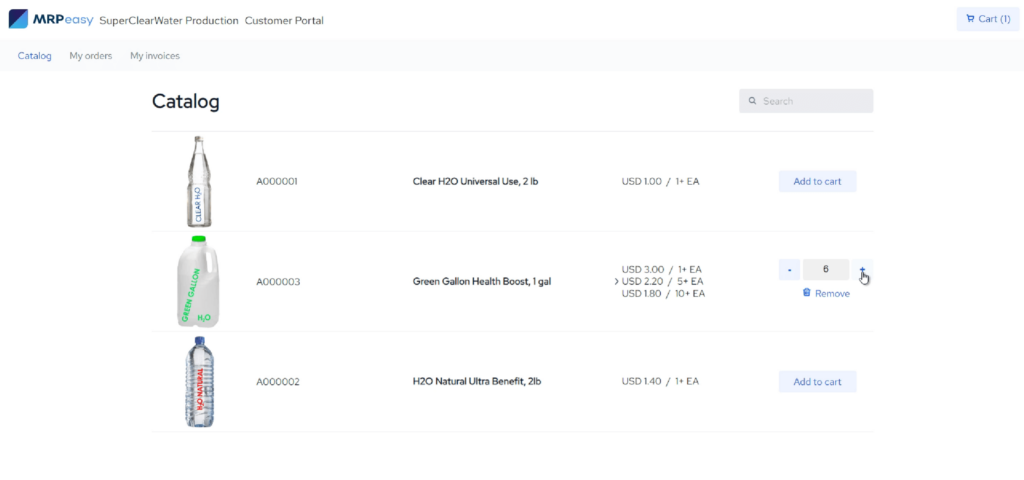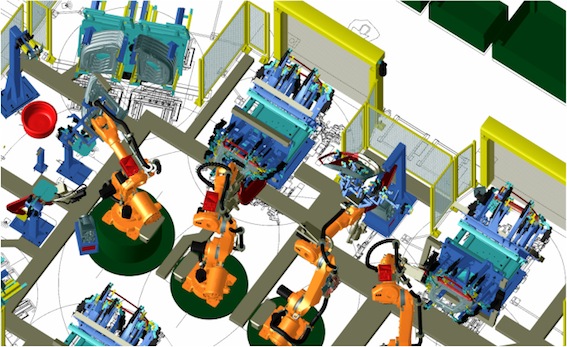Why It’s Good to Have a B2B Customer Portal in Your ERP System
E-commerce is the new normal for not only end-consumers but also for manufacturing and distribution companies. Customer portals are a rising trend, gaining popularity across a large number of industries and markets, especially among B2B businesses.

You can also listen to this article:
What is a B2B customer portal?
A B2B customer portal is an online interface enabling a company to streamline customer communications. It’s a self-service environment that facilitates sales and enables clients to track their orders and access other account management features. While customer portals are foremost intended to facilitate business-to-business sales interactions for B2B companies, they can also be useful as direct-to-consumer (D2C) or business-to-consumer (B2C) interfaces.
Customer portals are often add-ons of a CRM (Customer Relationship Management) system. Or they can be integrated into a company’s larger ERP solution. In the latter case, they may also be referred to as ERP client portals. These are integrated directly with the seller’s inventory or manufacturing software allowing orders and invoices to carry over automatically. This reduces administrative load and automates large parts of order management.
Customer portals are powerful tools for many use cases. They simplify both sales and procurements for manufacturers and distributors alike. The client has round-the-clock access to their order and account data while the seller can better manage customer data, streamline sales, and simplify account management.
Customer portals vs web stores
While the terms are sometimes used interchangeably, B2B customer portals are distinct from web stores chiefly by the scope of their functionality. Web stores are online interfaces designed mainly to enable customers to browse product catalogs and process sales transactions. A customer portal, on the other hand, extends this by giving customers access to a wider range of account management tools.
Customer portals enable clients to manage their account details, view order histories, access invoices, view and track deliveries, etc. They also enable a more customized user experience than simple web stores as the seller can more easily provide its customers with client-specific catalogs and price lists.
Core features of a B2B customer portal
Order management and cost breakdown
A B2B customer portal simplifies order management and sales for both parties. Customers can place orders and reorder goods at their convenience, view detailed cost breakdowns, and track the status of their orders in real time. Sellers benefit from automated order processing which reduces administrative load and improves operational efficiency.
This transparency helps planning and budgeting, as clients can see itemized costs and discounts applied while sellers take advantage of increased automation and efficiency in order processing and inventory management.
Custom product catalogs and pricing
Another central functionality of B2B customer portals is the capacity to differentiate product catalogs by individual clients. The seller can pick and display custom product information and pricelists per client or client segment, simplifying client account management.
As custom pricing or discounts can be offered directly based on the client’s purchase history, volume, or contract terms, customer portals can simplify the sales process to a large degree. This personalized approach helps in nurturing client relationships.
Shipments, invoices, and tracking order statuses
Customer portals also enhance traceability by enabling the monitoring of order statuses and shipments. This provides clients with up-to-date information on estimated fulfillment dates and shipping statuses.
Integrated invoicing allows clients to view, download, and send invoices directly to payment through the portal. These features further enhance the customer experience, offering convenience and transparency throughout the buying process.
Self-service account management
Customer portals enable clients to take limited control of their accounts with a seller. For example, they could update their company information, manage their shipping and billing addresses, check invoices, track deliveries, or set preferences for communications and notifications.
This autonomy improves the customer experience by providing flexibility and convenience but also reduces the workload on the seller’s customer service and support resources.
The benefits of integrated B2B customer portals
As noted, B2B customer portals have a multitude of benefits for both the seller as well as the buyer, especially if directly connected to the seller’s overall inventory and production management solution.
Let’s take a closer look:
- Improved customer experience. Portals offer a personalized, user-friendly interface that allows B2B buyers to manage their accounts, track orders, and access information easily, leading to a more satisfying and efficient customer journey.
- More efficient sales. By automating the sales process and providing customers with self-service options and custom pricing, companies can close deals faster and generate more sales while sales reps can focus on more effective customer engagement.
- Advanced sales strategies. A customized approach to sales simplifies utilizing advanced sales tactics like cross-selling or up-selling. Suggesting relevant additional products or higher-value alternatives during the ordering process can boost sales and enhance the customer experience by providing tailored recommendations. This makes customer portals a strategic tool for deepening customer relationships and driving revenue.
- Data analysis and automated reports. Integrated portals facilitate the collection and analysis of customer and order data. This automatic data flow into the central manufacturing software enables companies to better analyze customer behavior, order patterns, and preferences.
- Easier order management. Integrated B2B customer portals streamline order processing, reducing manual entry and errors for sellers while offering buyers a platform to easily place, manage, and reorder their sales orders. This improves inventory forecasting and operational efficiency while at the same time enhancing the purchasing experience for buyers.
- Always available. Portals provide 24/7 access to order statuses and other information, enabling buyers to place orders, check statuses, and manage their invoices at any time, improving convenience and satisfaction.
- Better customer retention. By offering a streamlined, accessible, and personalized online experience, companies can improve customer loyalty and retention. Clients are more likely to return to a platform that efficiently meets their needs and provides autonomy.
- Data security. Integrated customer portals are often part of central manufacturing ERP software, benefiting from robust data security measures. Encrypted transactions and data storage offer a safer alternative to email communications, protecting sensitive information from unauthorized access.
- Reduced customer service costs and increased customer loyalty. Self-service portals reduce the need for direct customer service intervention. This autonomy lowers operational costs while also enhancing customer satisfaction, which, in turn, fosters loyalty.
- Shorter quote-to-order times. The streamlined nature of portals allows customers to receive quotes, place orders, and reorder conveniently, reducing the time from quote to order. The ability to track order statuses further enhances efficiency and customer satisfaction.
MRPeasy’s B2B customer portal functionality
MRPeasy includes a comprehensive B2B interface available in the software’s Professional tier and onwards. This powerful feature gives MRPeasy’s B2B clients access to a robust customer portal with essential features for completing sales and simplifying order management.
The B2B customer portal serves as an extended web store interface, granting limited access to your customers. Choose which customers receive access and effortlessly revoke access at any time.
Once authorized, customers can easily place customer orders (CO) and reorder goods within the portal for designated products. They can also track order statuses, pick shipping addresses from any addresses assigned to them, and manage their invoices.

For MRPeasy’s clients, the customer portal enables you to:
- Easily invite customers to the portal.
- Offer customized or discount prices and custom catalogs for customers of your choice.
- Effortlessly manage customer orders placed within the portal through MRPeasy.
- Automatically provide customers with detailed and always up-to-date information on order statuses, expected delivery dates, shipments, and tracking numbers.
For your customers, the customer portal enables you to:
- Browse a product catalog designated via a custom or default price list on the Catalog page.
- Independently create, manage, and send customer orders via the Cart page.
- Monitor all orders, CO numbers, order statuses, tracking numbers, and expected delivery dates on the My Orders page.
- View and export invoices linked to customer orders on the My Invoices page.
- Manage and edit shipping addresses or arrange to pick up the order from the vendor.
The customer portal can be switched on under Settings -> Professional Functions -> B2B Customer Portal. Visit our knowledge base for a complete overview of MRPeasy’s customer portal functionality.
Key takeaways
- A B2B customer portal is an online platform that streamlines communication and transactions between businesses, offering self-service capabilities for order and account management. It integrates with a company’s CRM or ERP system, enhancing efficiency and data accuracy.
- Customer portals are distinct from simple web store interfaces by providing a broader range of functionalities and customer interactions beyond simply facilitating sales. This includes custom catalogs, tailored pricing options, and tracking orders.
- Essential customer portal features include self-service account management tools, order management and cost breakdown, custom product catalogs and pricing, and shipment and invoice tracking. These collectively improve the purchasing process and customer experience.
- The benefits of customer portals to sellers are plentiful, including more efficient sales processes, enhanced data analysis and reporting, and improved customer retention through personalized experiences. They also significantly reduce the manual workload by automating sales and order processing.
- The benefits of customer portals to buyers include round-the-clock access to their account and order information, personalized shopping experiences, and the convenience of managing orders and tracking shipments online. This level of accessibility, traceability, and personalization leads to a more satisfying buying journey.
- MRPeasy includes a B2B customer portal designed to streamline sales and simplify order management for businesses. This feature facilitates easy order placement and management for customers and seamlessly integrates with MRPeasy’s broader ERP functionalities, enhancing overall operational efficiency.
Frequently asked questions
Customer portals streamline operations by enabling customers to manage their orders and access their account information directly. This often leads to improved customer satisfaction as clients benefit from autonomy and the convenience of 24/7 access to their accounts. Additionally, the portal can help boost sales through personalized product recommendations, facilitating cross-selling and up-selling opportunities.
Integrating a B2B customer portal with an existing CRM or MRP system can present challenges as aligning the software often requires technical knowledge or using third-party workflow automation software. A practical alternative is to choose a production or inventory management software with a built-in customer portal. This central hub ensures seamless operation and data synchronization across all business processes.
A B2B customer portal enables personalized experiences and transparent access to real-time order tracking and account information. This builds trust and reliability, making customers feel more valued. Access to historical data also simplifies reordering, simplifying the ordering process for recurring customers.
By automating parts of order management, a B2B customer portal reduces manual errors and speeds up the ordering process. It provides real-time updates on order status from placement to delivery, reducing customer support inquiries and enabling better planning for both customers and businesses.




